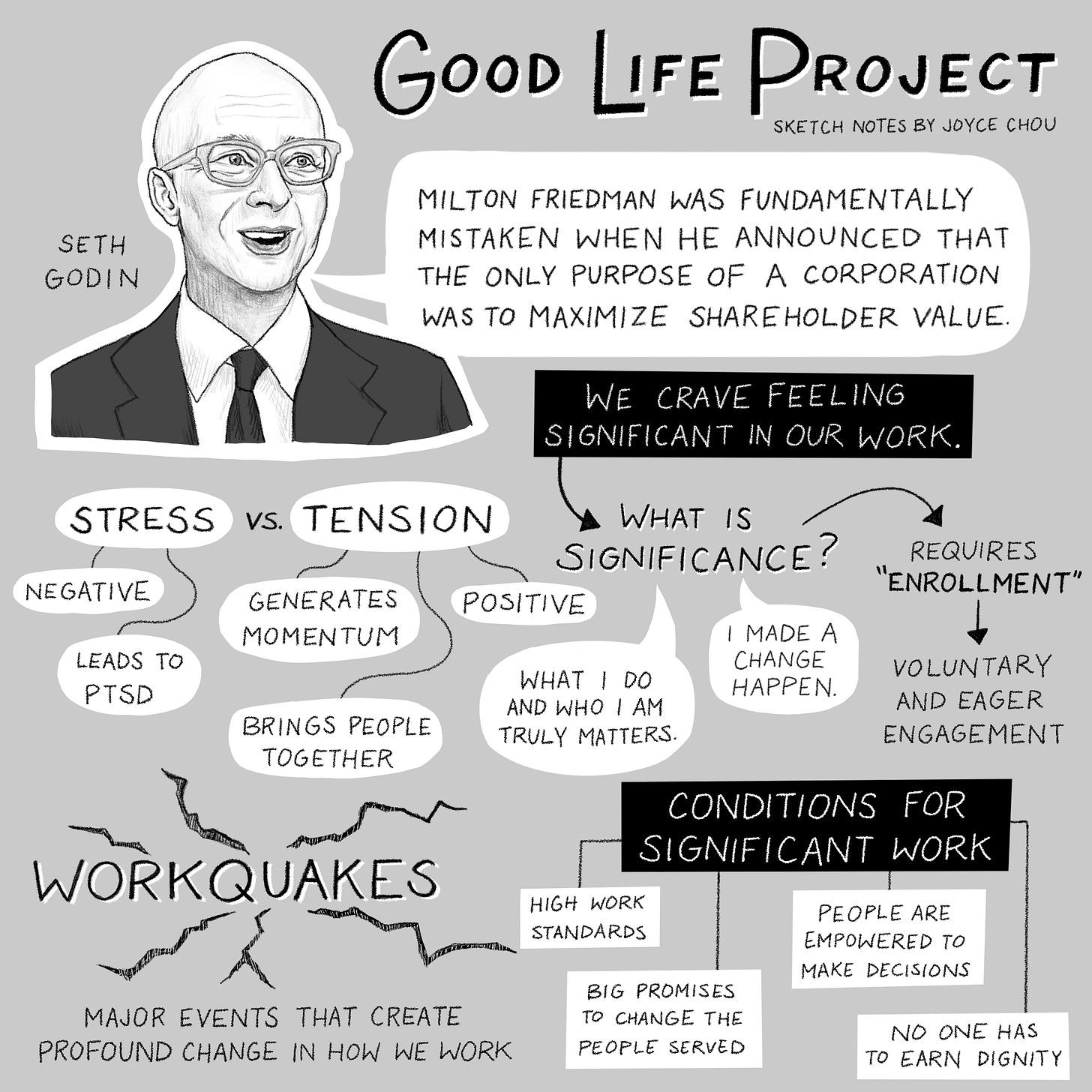How to create work that matters
Entrepreneur and author Seth Godin on the desire for significance in the workplace
“Milton Friedman was fundamentally mistaken when he announced that the only purpose of a corporation was to maximize shareholder value.”
–Seth Godin
Quick Summary
Host Jonathan Fields unpacks entrepreneur and author Seth Godin’s definition of significance—and why feeling significant at work matters more than ever. Seth explains how recent events like the worldwide pandemic have challenged our previous expectations for work.
You can catch the complete episode (1 hour, 2 minutes) on Spotify.
Key Takeaways
Our attitudes about work have changed because of recent “workquakes” like COVID-19. Taking inspiration from Bruce Feiler’s idea of “lifequakes,” Jonathan uses workquakes to describe major events that create profound change in how we work. The worldwide pandemic is an obvious workquake. Other ones: industrialization, the invention of the internet, and happening right now, the rise of AI.
We crave feeling significant in our work. Seth surveyed thousands of people across 90 countries about the qualities of the best jobs they ever had, with options like “I got paid a lot” and “I didn’t get fired.” Over and over again, he observed that what people most valued was the feeling of significance—doing work that mattered and with people who cared. Or, another way of thinking about significance: making change happen.
Seth objects to Milton Friedman’s idea that the sole purpose of companies is to make a profit. Creating significance in the workplace—or transforming it into a source of meaning and fulfillment—isn’t about getting bosses to be more lenient and understanding. According to Seth, it involves “raising our standards, [and] making big promises to change the people we serve. That will make us feel terrific and engaged, and elevate us and our customers.”
Significant work doesn’t mean working toward a social good (although it can). You can find significance working for a financial institution or retail company. It’s not about having a noble cause but rather, being empowered and committed to doing incredible work with other similarly dedicated people.
Significance requires enrollment. Seth describes this as voluntary and eager engagement—the willingness to participate. You can often find enrollment in local groups like community orchestras: people want to be there even if they have to pay dues. Compare that to traditional companies that retain employees by limiting their options. For example, companies that surveil their employees or mandate returning to the office in spite of their work not necessitating it.
If Seth ran a large company, he says he’d “regularly run resume improvement sessions, teaching people to make their resume better. I want them to stay because they can and want to, not because they feel like they have no options.”
Seth brings up real-life companies throughout the conversation as examples of companies “racing to the top.” These are companies that create significance by empowering their employees and uniting around a clear mission.
Aravind Eye Hospitals is an Indian hospital network that offers blindness-preventing surgeries for free or at a heavily subsidized cost (something like $130 USD). Their standards are extraordinary. According to Seth, you’re more likely to get an infection from the same surgery being done in London for thousands of dollars than in an Aravind clinic.
Greyston Bakery in New York produces the brownies used in Ben & Jerry’s ice cream. It has a unique open hiring policy where anyone who wants a job gets a chance—no background checks or pre-screenings needed. Inspired by Greyston, the Body Shop introduced the same policy and saw productivity grow and employee turnover drop drastically.
Though not a perfect boss, Henry Ford more than doubled the average factory wage for his auto workers in 1914 to $5. He supposedly did this to empower his employees to buy cars. It looks like this actually isn’t the whole story—the wage increase was partly to reduce turnover. Nonetheless, Seth mentions Ford to explain how creating significance in your workplace attracts better talent, and in turn, produces greater output.
Thoughts
During their conversation, Jonathan and Seth talk about belonging as a critical human need, and why we shouldn’t count on work to fulfill it. I’ve heard this before, too—that thinking of your manager or coworkers as your “work family” creates harmful and misguided emotional attachments. (Imagine getting fired from your family, oof.) Instead, Seth says companies should “give people agency to go find belonging” and suggests examples like joining the community orchestra and volunteering. Although neither he nor Jonathan explicitly talks about work-life balance, this seems to be another aspect of significant work: it shouldn’t be so all-consuming that it takes you away from other parts of life.
If you made it this far, thank you for being here! The best way to support Sketch Pad is by liking this post on Substack or sharing these notes with someone who might enjoy them. And if you’d like to, send me your podcast recommendations here.
–Joyce





This is so cool! Such a good summary, thanks for sharing :)